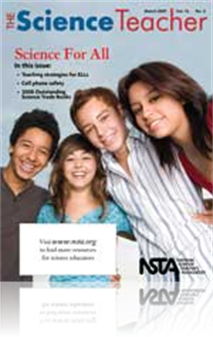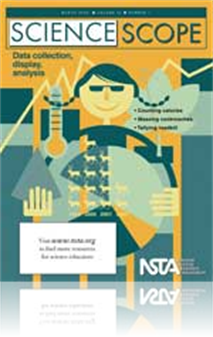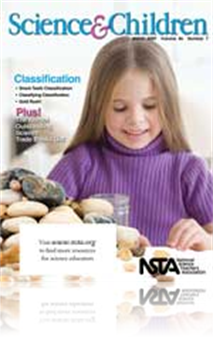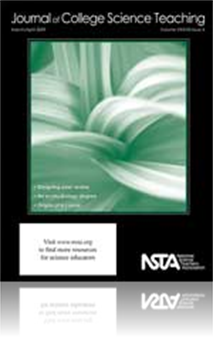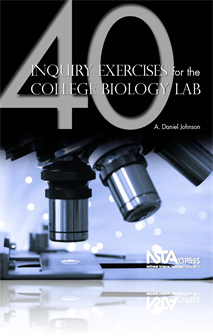All Resources
Journal Article
The Prepared Practitioner: Multiple-Choice Season
Spring is almost here. Soon buds will appear on trees, and bubbled-in answers will appear on test response sheets all across America. Spring brings a spate of multiple-choice tests for many students—from SATs to AP exams to final exams to state and...
Journal Article
Idea Bank: Astronomy for Students With Sensory Impairments
The Space Exploration and Experience (SEE) Project and Yerkes Astrophysics Academy for Young Scientists (YAAYS)—both at the University of Chicago’s Yerkes Observatory in Williams Bay, Wisconsin—are designed to promote active learning in astrono...
Journal Article
Teaching With Multiple Methods in Mind
Teachers know what a daunting job it can be to ensure that all students in a class learn effectively. In addition to the usual difficulties of gaining everyone’s attention at once, instructors also run into the issue of preferred learning styles. I...
Journal Article
My students are on their cell phones all the time! Do cell phones really harm the brain? And what about the teen brain? ...
Journal Article
Scope on Safety: Safety in the Science Classroom—An online resource from NSTA
NSTA’s Science Safety Advisory Board has developed a new online resource for science teachers, Safety in the Science Classroom. The document introduces the Standards of Student Conduct in the laboratory and in the Field (SSCLF)—a list of behavior...
Journal Article
Your students successfully completed a lab session, correctly filled in all of the worksheets, and collected the required data. Yet, as a science teacher, you still find yourself wondering—what did my students actually learn? And, can they apply t...
Journal Article
Teaching Through Trade Books: Pondering Popcorn
When most people hear the word, popcorn, they think of a tasty treat enjoyed at the movies. In this month’s column, popcorn takes center stage as students engage in investigations relating to observations and predictions, as well as conducting an e...
Journal Article
Science Sampler: Plastics in our environment—A jigsaw learning activity
In this lesson, a ready-to-teach cooperative reading activity, students learn about the effects of plastics n our environment, specifically that certain petrochemicals act as artificial estrogens and impact hormonal activities. Much of the content i...
Journal Article
Self-assessment is a win-win evaluation system. Evaluees, not the department or university, control the process by selecting the evaluation criteria. Self-assessment also eliminates the uncomfortable and burdensome task of peer evaluation. Self-evalu...
Journal Article
Ecohydrology as an Undergraduate Degree: Challenges in Developing an Interdisciplinary Major
In the new ecohydrology major at the University of Nevada, Reno (UNR), students learn about the relationships between hydrologic mechanisms and ecological patterns and processes in watersheds and aquatic systems. The curriculum provides students with...
Journal Article
Designing Peer Review for Pedagogical Success: What Can We Learn From Professional Science?
This article compares peer review in professional versus education settings, summarizing key aspects of scientific peer review and reflecting on how these relate to the process as experienced by students. Consideration of professional peer review ben...
Journal Article
This article describes the experience of a group of first-grade teachers as they tackled the science process of classification, a targeted learning objective for the first grade. While the two-year process was not easy and required teachers to teach ...
Journal Article
Challenges and Solutions for ELLs
Preparing students for high-stakes testing presents a constantly increasing challenge for science teachers. Not only do students vary greatly in their science knowledge and backgrounds, but also English Language Learners (ELLs) are often placed in ma...
Journal Article
Favorite Demonstration: The Internet-Telephone Interview as a Classroom Teaching Tool
The in-class telephone interview is discussed as a teaching tool that adds an additional active-learning dimension to a classroom environment. Students can actively engage in dialogue with the interviewee using high-speed internet and low-cost servic...
Journal Article
Editor’s Corner: Our Patchwork Heritage
Enriching the classroom experience for all learners will contribute fabric to the great patchwork heritage that is our nation’s strength. Therefore, in recognition of the need to include all types of diverse learners, this issue of The Science Teac...
Journal Article
Perspectives: Helping Students Understand the Nature of Science
An important goal of science teaching is to help students understand the “nature of science”—what science is and how science works. The nature of science addresses the importance of creativity and imagination in scientific work; how scientists ...
Journal Article
Big Macs and Healthy Teens? Exploring Fast Food as Part of a Healthy Adolescent Lifestyle
In the set of activities, explorations, and discussions described here, students apply healthy eating information when they make nutrition choices both at home and when eating out. These lessons introduce considerations such as portion size and calo...
Journal Article
On a recent autumn afternoon at Harmony Leland Elementary in Mableton, Georgia, students in a fifth-grade science class investigated the essential process of classification—the act of putting things into groups according to some common characterist...
Journal Article
Libros de Ciencias en Español: A selection of recent science trade books in Spanish (March 2009)
Simple, lively, and easy-to-understand science books in Spanish for the very young are the new reality in the publishing world. In contrast to previous years where there has been a wider selection of books for beginning, middle, and advanced readers,...
Journal Article
Roadkill Data Analysis: Using Spreadsheets to Integrate Math and Science
The process of inspiring students into framing authentic questions and then providing them structured support in answering the questions through scientific research is widely recognized as a key element, if not the heart and soul, of inquiry-based sc...
Journal Article
A Land-Use-Planning Simulation Using Google Earth
Google Earth (GE) is proving to be a valuable tool in the science classroom for understanding the environment and making responsible environmental decisions (Bodzin 2008). GE provides learners with a dynamic mapping experience using a simple interfac...
Journal Article
Sheltered Instruction Techniques for ELLs
The suggestions described here to adapt instruction for English Language Learners (ELLs) are based on the concept of sheltered instruction, a model of language-support methods for instruction for ELLs derived primarily through the Sheltered Instructi...
Journal Article
Outstanding Science Trade Books for Students K–12 (Books published in 2008)
Today’s classrooms have no real walls! Students explore the world on field trips, during virtual journeys on the world wide web, and through the books they read. These pathways help them fly to the ends of the universe to satisfy their scientific c...
Journal Article
Safer Science: Lifesaver Resources for Chemical Selection
High school science teachers, supervisors, and chemical hygiene officers (CHO) can turn to a number of internet resources for help when making decisions about hazardous chemical use. Before considering these resources, it is important to research loc...
Journal Article
Some may argue that gifted children have many education options, but these options do not always help gifted students learn science. Unfortunately, gifted students often do not reach their full academic potential—they are frequently less motivated ...
Book Chapter
Ethology—the study of animal behavior—combines the observational skills of a natural historian with modern insights from ecologists, geneticists, and especially evolutionary biologists. In this unit, students discover more of the behavior reperto...
Book Chapter
The ultimate function of most physiological processes is to help organisms maintain overall homeostasis, while letting them adapt to changes in internal and external environments. In this unit, heart rate is the model for studying homeostasis. The st...
Book Chapter
Students will use weight potometry to estimate the basal rate of transpiration for bean plants. For the exercise, they will estimate the soil salinity necessary to stop transpiration by mung bean seedlings. Subsequently, students will have the opport...
Book Chapter
Metabolism and Oxygen Consumption
In this unit, students first conduct an experiment to determine if there is a relationship between environmental temperature and rate of metabolism in crayfish (Orconectes). Students also look at whether there is any effect of body size on specific m...
Book Chapter
In this unit, students compare allocation strategies among plant species and within a species under different abiotic conditions. Students will quantify how seedlings of several common crop plants allocate their carbon and nitrogen resources by measu...
Book Chapter
In this unit, students explore how biotic and abiotic factors affect population growth. They explore the effects of competition on growth of different species of molds. Students have actively growing cultures with which to make an inoculation mix of ...
Book Chapter
Measuring Biological Diversity
Biological diversity is a hallmark of life on Earth. In this unit, students estimate biological diversity in two different aquatic ecosystems. They collect water and bottom detritus from two locations and make field notes about the locations. Each wo...
Book Chapter
Designing Scientific Experiments
In this unit, students learn about designing sound, testable hypotheses and experiments. A testable hypotheses is one that is stated in a way that makes predictions that can be tested. The goal of the unit is for students to unravel a simple biologic...
Book Chapter
In a typical Mendelian genetics lab, students cross flies or other organisms of known genotypes, score phenotypes of the offspring, and determine if their results are significantly different from expected phenotype ratios. For this unit, the traditio...
Book Chapter
In this unit, students will isolate DNA suitable for sequencing and other analyses. Students use bioinformatics software to find differences between normal and mutant DNA sequences, then use DNA restriction mapping to confirm the differences. In orde...
Book Chapter
Enzymes are specified proteins that catalyze chemical reactions in biological systems without being permanently changed or used up. This unit was developed to help students gain a more functional, intuitive understanding of how enzymes work, what fac...
Book Chapter
This unit focuses on properties and functions of enzymes. Students will discover for themselves how enzyme concentration, environmental conditions, and potential inhibitors affect enzymes. The unit is more challenging for students as they must apply ...
Book Chapter
The process of photosynthesis is the key to life on Earth. In this unit, students will learn to make an enriched chloroplast preparation from spinach leaves. They will measure relative redox activity by mixing them with DCIP, an indicator dye that c...



